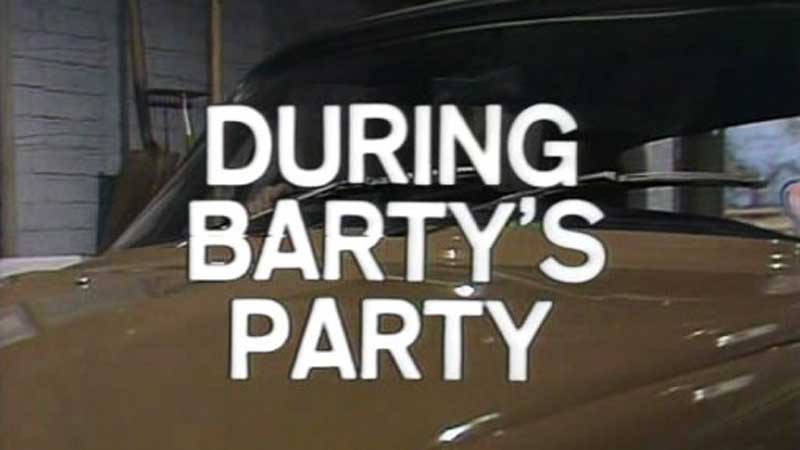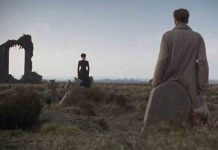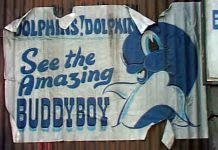CHRIS NEWTON takes a look at During Barty’s Party, part of Nigel Kneale’s memorable 1970s TV horror anthology Beasts

Most episodes of Nigel Kneale’s 1976 anthology horror series ‘Beasts’ have a minimalist, and often claustrophobic atmosphere, none more so than the second episode, ‘During Barty’s Party’.
Aside from overheard voices, telephone calls and radio broadcasts, the only two actors onscreen are Elizabeth Sellars and Anthony Bate as Angie and Roger Truscott, a middle-aged married couple who live in a remote farmhouse in Hampshire.
The level-headed Roger arrives home to find his wife in a state of hysteria, seemingly because of a rat she has heard scratching beneath the floorboards, and an abandoned open top sportscar she has glimpsed in the distance through her window.
Almost immediately I noticed a parallel with another Beasts episode, ‘Baby’, in than both feature married couples in an isolated country setting. But whereas the Gilkes are a newlywed couple trying to start a family, the Truscotts are an older couple whose daughter Kate has long since married and left home. And whilst Baby’s young expectant mothers’ fears are dismissed as ‘hormonal’, here Angie wonders if her anxiety is related to her age.
“When people get older, their brain cells perish. That means getting stupid. Suppose I got really stupid…”
Doubting her own sanity, Angie is trying to block out the gnawing and scratching by playing her daughters records at full volume, leading to one of my favourite exchanges in the episode: “Rock ‘n’ roll?” “I suppose so.” “That’s what it is. You don’t like rock ‘n’ roll!”
Much like the character of Peter in ‘Baby’, Roger seems far less concerned with his wife’s wellbeing than he is mortified that she rang his office in a state of distress.
The episode’s title comes from the name of the radio show Angie insists on listening to, but this does little to allay her fears when Barty, the host, reports that migrating swarms of rats have been spotted in the Hampshire countryside.
Beast’s overall theme – the inescapable savagery of nature – is keenly felt here, with the notion of nature reclaiming civilisation; in this instance the beasts supplanting humanity as top of the food chain.
The fear of just how tenuous or fleeting our dominion over our natural environment might be is reflected in Roger’s insecurity that they are ‘townies’ and that ‘real country folk’ would know how to better handle their situation.
Another recurring theme of the series is the notion of humans being reduced to – or rather reverting to – the level of beasts.
There is something primal in the notion of protecting one’s own house from infestation, excellently realised as Roger repeatedly strikes the floorboards with a fire poker as he yells “Vermin! Vermin! Vermin!” Interestingly, in another parallel with ‘Baby’, the Truscotts also have a pet who flees at the first sign of danger, in this case Buster the dog, who is nowhere to be seen. Hiding in safety or savaged by rats?
The paranoia and claustrophobia gradually build as the scratching and squealing grow louder and louder. Roger begins the episode dismissing his wife’s terror and opining that the ‘abandoned’ car is a result of nothing more sinister than a lover’s picnic and blames her over-active imagination on “all those paperbacks you keep getting!” He ends up a screaming, trembling mess, and it is Angie who has to try and drag him from the house.
The image of the two of them cowering on the staircase and donning fencing masks in a desperate bit to save their eyes from being eaten by rats is horrifically iconic, and it is remarkable to consider that, by this point in the episode, not only have we not seen another human being: we haven’t seen a single rat.
As well as the obvious parallels with ‘The Birds’, the whole episode has a hugely Hitchcockian atmosphere of suspense and dread. It also bears a similarity to the real-time nature of Hitchcock’s ‘Rope’ in that (barring the opening few seconds) it was filmed in a single, continuous take.
There is little in the way of editing and, in true ‘Beasts’ fashion, no score save the insufferable radio jingles. All of the tension and terror come solely from the genius dialogue and the performance, all of which would easily work just as well as a stage play or audio drama today and wold feel just as fresh, just as tense and just as savage.
We should know by now that most of the characters in ‘Beasts’ are doomed from the off, but Kneale cruelly gives is hope for the Truscotts when Angie phones Barty’s Party and begs the outside world for help. That is before the rats chew through the phone wires just as Angie is trying to explain their middle-of-nowhere address. Any hopes that help is on they way are dashed when we realise that the idiotic Barty misheard her name as ‘Prescott’.
Whilst there are elements of Hitchcock, and definite echoes of Lovecraft’s ‘The Rats in the Walls’, ‘During Barty’s Party’ is very much in a league of its own.
As with other episodes of ‘Beasts’, ambiguity abounds, and the fate of the Truscotts is left up to us to imagine or explain.
It could even be argued that there were never any rats, and that the faint gnawing they ignored by turning up the radio until it became a deafening cacophony of infestation is all a metaphor for the cracks in a loveless marriage where the lonely housewife drinks too much and the husband is more concerned with his career than his relationship.
(In which case the abandoned car by the lover’s lane opposite their house takes on a whole new connotation.)
Whatever the truth: you’ll never hear ‘Shout’ or ‘Hippy Hippy Shake’ the same way again!
Discover Nigel Kneale’s Beasts with our Beasts TV Episode Guide
Watch During Barty’s Party
What did you think of During Barty’s Party? Tell us in the comments section below!








Wow, you’re REALLY evoking the flood of memories here! Along with the dominance of ABBA in the UK charts, Nigel Kneale’s Beasts series was my other endearing memory of that year. During Barty’s Party is a masterpiece of creepy TV, and I still remember the November night when it was first shown. Thought the intense feelings of claustrophic horror and the ominous atmosphere of the unseen but scarily audible rats was superb! Why can’t they make classic series like this anymore?